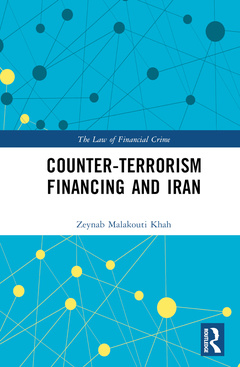Counter-Terrorism Financing and Iran The Law of Financial Crime Series
Auteur : Malakouti Khah Zeynab

This book blends doctrinal and empirical research to examine the phenomenon of counter-terrorism financing at the level of both international and Iranian national law.
The work discusses the legitimacy, fairness and effectiveness of the international counter-terrorism financing framework, and then examines to what extent Iran has implemented it. The main focuses of the book are on the criminalisation of terrorism financing; financial regulations as preventive measures applied to the sectors at risk of terrorism financing, including the formal financial system, the informal financial system and the non-profit organisations; and the international and unilateral sanctions imposed on individuals and entities who support terrorist acts, terrorists and terrorist organisations. Given that terrorism and terrorism financing are socio-legal, political and economic phenomena in nature, the book approaches the problem of terrorism financing from an interdisciplinary perspective, exploring the relationship between the characteristics of Iran as a state recognised for supporting non-state militant actors (NSMAs), some of which are designated as terrorist by some countries. Empirical research includes documentary fieldwork in Iran, with the collection of original and primary materials that have not previously been analysed. The book also adopts a policy transfer approach, using the rules and regulations of the United Kingdom.
Presenting a non-Western perspective on counter-terrorism financing, the book will be essential reading for students, researchers and policy-makers working in the area of financial crime.
List of Legal Instruments
List of Cases
List of Tables
List of Figures
List of Abbreviations
Acknowledgement
Note for the Reader
1 Introduction
1.1 Iranian Domestic Issues and Its Foreign Policy
1.2 International Instruments of Counter-Terrorism Financing and Iran’s Responses
1.3 International and Unilateral Sanctions Imposed on Iran
1.4 Scope of Book
1.5 Objectives of Book
1.6 Research Method and Methodology
1.7 Contents Overview
2 Background to Terrorism and Financing Terrorism in Relation to Iran
2.1 Introduction
2.2 Power Structure in the Iranian Constitution
2.3 Values in the Iranian Constitution
2.4 Iran: Victim or Sponsor of Terrorism?
2.4.1 Iran as a Victim of Terrorist Attacks
2.4.1.1 Dissident Nationalist Terrorism
2.4.1.2 Foreign Terrorism
2.4.1.3 Separatist Terrorism
2.4.2 Iran as a State-Sponsor of Non-State Militant Actors
2.4.2.1 Non-State Militant Actors Supported by Iran
2.5 Iranian Policy in Combating Terrorism Financing
2.6 Conclusion
3 Criminalisation of Terrorism Financing
3.1 Introduction
3.2 Legal and Policy Framework of Terrorism Financing
3.2.1 International Legal and Policy Framework
3.2.2 Iranian Legal and Policy Framework
3.2.2.1 Reliance on General Laws (2001–2008)
3.2.2.2 The Anti-Money Laundering Law (2008–2016)
3.2.2.3 The Law of Combating the Financing of Terrorism (2016–Present Day (2023))
3.3 Mental Elements of Off ences of Terrorism Financing
3.4 Material Elements of Off ences of Terrorism Financing
3.4.1 Providing or Collecting Funds
3.4.2 Terrorist Attacks
3.4.2.1 Treaty-Based Acts
3.4.2.2 Catch-All Acts
3.4.2.3 Unlawful Acts
3.4.3 Non-Attack Purposes
3.5 Exemption for National Liberation Movements
3.6 Conclusion
4 Preventive Measures of Counter-Terrorism Financing
4.1 Introduction
4.2 Preventive Measures as Applied to the Formal Financial System
4.2.1 Customer Due Diligence and Monitoring
4.2.1.1 Identifi cation and Verifi cation
4.2.1.2 Enhanced Due Diligence
4.2.2 Suspicious Transaction Reports (STRs)
4.2.3 Financial Intelligence Unit
4.3 Preventive Measures as Applied to Informal Financial Systems
4.3.1 Licensing or Registration
4.3.2 The Regulations for the Hawala System
4.3.3 Sanctions on Hawala System
4.4 Preventive Measures as Applied to Non-Profit Organisations
4.4.1 Charity and Civil Society
4.4.2 Charity and Humanitarian Aid
4.5 Consequences of CTF Regulation: Financial Exclusion
4.5.1 Individuals
4.5.2 Correspondent Banking Relationships (CBRs)
4.5.3 Money and/or Value Transfer Services (MVTS)
4.5.4 Charity
4.6 Conclusion
5 The International and National Sanctions Regimes to Counter-Terrorism Financing
5.1 Introduction
5.2 UN Sanctions Regimes
5.2.1 Legitimacy of the UNSC Sanctions Regimes
5.2.2 ISIS, Al-Qaeda and the Taliban Sanctions
5.2.3 UN Sanctions Implementation by Iran
5.2.4 UN Sanctions Regimes Against Iran
5.3 Unilateral Sanctions Regimes
5.3.1 Lawfulness of Unilateral Sanctions Regimes
5.3.2 Extraterritorial Eff ects of Unilateral Sanctions
5.3.3 The Impacts of Unilateral Sanctions on Human Rights
5.3.4 Iran’s Reaction to the Imposed Sanctions
5.4 Conclusion
6 Explanations and Conclusion
6.1 Introduction
6.2 Summary of Findings
6.3 Recommendations and Prospects for Implementation
Index
Zeynab Malakouti Khah is an assistant professor of the Research Center and UNESCO Chair for Human Rights, Peace and Democracy, Shahid Beheshti University, Tehran, Iran.
Date de parution : 10-2023
15.6x23.4 cm
Thèmes de Counter-Terrorism Financing and Iran :
Mots-clés :
Iran; Terrorism; Counter-terrorism financing; Criminalisation; Preventive measures; International sanctions; Unilateral sanctions; CTF; Financing Convention; FATF’s Recommendation; Humanitarian Aid; Informal Financial Systems; Unilateral Sanctions Regimes; Hawala Networks; ISIS’s Attack; UK Terrorism Act; Formal Financial System; Sanctions Regimes; EU Exit; SNSC; Targeted Sanctions; TF Offence; Hawala System; Financial Exclusion; Internationally Wrongful Act; Extraterritorial Sanctions; Ransom Payments; EU Sanction; Al Qaeda Sanctions Committee; NPT Obligation; Policy Transfer Approach



